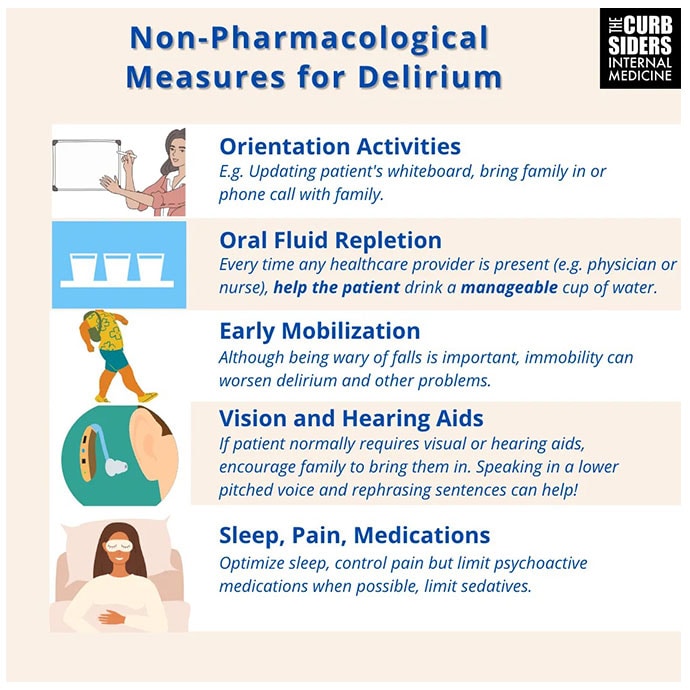This transcript has been edited for clarity.
Matthew F. Watto, MD: Welcome back to The Curbsiders. Today we're going to be recapping some pearls from a fantastic episode, Delirium in the Hospital, featuring Dr Esther Oh. Were you aware that delirium was such a dangerous thing for the brain?
Paul N. Williams, MD: I did not know that. I don't think I realized the consequences of delirium, which we spent some time talking about with Dr Oh.
Watto: Dr Oh told us that when someone is having delirium, there is underlying inflammation and even neuronal damage going on, and that down the line, those people are at increased risk for dementia and cognitive decline. It's really an emergency when it happens. We want to prevent delirium, of course, but we also want to try to figure out why the patient has it and get them out of delirium as soon as we can. That was terrifying to me, Paul. I thought that when someone has delirium, they will get better and go back to normal. But no — the longer it goes on, the more severe it is, the more trouble their brain is in. That's a big problem. So how do we prevent it?
Williams: I was going to say, Matt Watto style — using your pedagogical technique — that my understanding is we should treat delirium immediately and forever with antipsychotics. Is that your general approach to delirium?
Watto: Oh, yeah, Paul, that is wrong. Here's what typically happens in the hospital. A patient has some behavior that is perhaps unpleasant, so they are started on antipsychotics which are just continued. Months later, the patient is out of the hospital, but they're still on antipsychotics. We want to avoid that because, as Dr Oh said, there's no evidence from randomized trials that antipsychotics prevent or treat delirium. The time for antipsychotics is when patients become a danger to themselves or others. Certainly, we see that in the hospital, and that's the time you can use antipsychotics. Just be sure you stop them because patients only need a couple of days of them, she said. In the long term, they are very bad for people and we don't want that to be perpetuated down the line.
Williams: You see in the ICU that someone is treated appropriately with an antipsychotic, but then the medication is continued when the patient is transferred to the floor. Our natural tendency is to think that if this patient has been started on an antipsychotic, it's probably for a good reason. I don't want to take that off the list. Then the patient is discharged, goes to see their PCP, and that thought pattern is perpetuated. So, we need to do our due diligence when the patient no longer needs to be on the drug. Remove it from the list and avoid the polypharmacy and all the adverse consequences.
So, what can we do? We have an excellent infographic that includes the great nonpharmacologic measures that we have for preventing and managing delirium.

We might think that because this isn't medication, it's not going to work, but these actually do work — for example, ensuring orientation. Signage is helpful, seeing their family, and visual cues about who their family members are. We might have to constantly remind patients where they are, making sure they have windows, and all that fundamental stuff.
Oral repletion is important — making sure water is within reach of the patient so they can orally hydrate. It's also important to get the patient mobile as quickly as possible, without falls, obviously, and making sure they can see and hear properly. Lower registers are often heard better, so lower your voice when speaking, and remember that certain soft sounds need to be enunciated to make sure that you are clear. Make sure that hearing aids and other assistive devices are in place if they are needed. And just letting your patients rest when it's sleepy time can also go a long way. Did I miss anything?
Watto: Dr Oh made the point that these things are easy things to do in theory, but they require a culture where these things are routinely done. And if the culture is just to slap restraints on the patient and pump them full of antipsychotics, then that's what's going to happen. Delirium is everyone's responsibility and it requires the doctors, the nurses, the family, and everyone else to do their part. It's a hard problem, and medications are not the answer. That's probably not what people want to hear, but that's the truth.
We went through a lot of great information on this episode with Dr Oh. I recommend that people click on Delirium in the Hospital and check out the full episode because there were so many other great pearls — way too many for us to recap here. This has been another episode of The Curbsiders, bringing you a little knowledge food for your brain hole.
Williams: One of these days, I'll throw a yummy in there and you won't know what to do.
Watto: Until next time, I'm Dr Matthew Frank Watto.
Williams: And I'm Dr Paul Nelson Williams. Thank you and goodbye.
Follow Medscape on Facebook, Twitter, Instagram, and YouTube
Credits:
All images: The Curbsiders
© 2023 WebMD, LLC
Cite this: Matthew F. Watto, Paul N. Williams. Delirium: Prevent Rather Than Prescribe - Medscape - May 08, 2023.















Comments